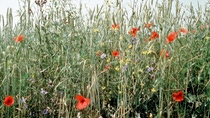Agriculture
Almonds
Almond trees are a particularly popular crop given the high demand for shelled nuts, essential oils and flour. The delicately flavored and versatile almond is available throughout the year to make a tasty and healthy addition to both sweet and savory dishes. The main world’s producers are the USA, followed by Spain, Iran, Italy, Morocco and other countries.

Almond trees are widely cultivated where environmental conditions promote the rapid and persistent growth of vegetation. Almond orchards may thus be infested with a variety of annual and perennial weeds that not only reduce yields, but can also cause problems with nut drying and gathering the crop from the orchard floor.
Glufosinate-ammonium is a highly effective tool for controlling a broad spectrum of weeds in almond trees and has thus enabled a significant increase in yields over the last three decades. The herbicide is applied around the almond trees and even if small amounts land on crop leaves there is minimal to no damage. The use of Glufosinate-ammonium as an alternative to commonly-used Glyphosate helps to avoid problems of weed resistance in almonds.

Did you know?
- Almonds are very effective in reducing “bad” cholesterol in blood. Eating about 42.5 grams of nuts a day may reduce the risk of heart diseases.1
- Two of the most difficult-to-control weeds in almond fields, horseweed and hairy fleabane, can reduce tree height in first-year orchards by 0.3 meters.2
Please select crop from list
1Center for Food Safety and Applied Nutrition, Office of Nutritional Products, Labeling and Dietary Supplements, Qualified Health Claims: Letter of Enforcement Discretion – Nuts and Coronary Heart Disease (Docket No 02P-0505), June 2008 Nuts and coronary heart disease: an epidemiological perspective
2Shrestha, A., Hembree, K, Wright, S. (2008) Biology and Management of Horseweed and Hairy Fleabane in California. University of California.








